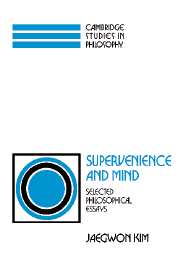Book contents
- Frontmatter
- Contents
- Preface
- Sources
- Part I Events and supervenience
- Part II Mind and mental causation
- 10 Psychophysical supervenience
- 11 Psychophysical laws
- 12 What is “naturalized epistemology”?
- 13 Mechanism, purpose, and explanatory exclusion
- 14 The myth of nonreductive materialism
- 15 Dretske on how reasons explain behavior
- 16 Multiple realization and the metaphysics of reduction
- 17 The nonreductivist's troubles with mental causation
- 18 Postscripts on mental causation
- Index
18 - Postscripts on mental causation
Published online by Cambridge University Press: 28 January 2010
- Frontmatter
- Contents
- Preface
- Sources
- Part I Events and supervenience
- Part II Mind and mental causation
- 10 Psychophysical supervenience
- 11 Psychophysical laws
- 12 What is “naturalized epistemology”?
- 13 Mechanism, purpose, and explanatory exclusion
- 14 The myth of nonreductive materialism
- 15 Dretske on how reasons explain behavior
- 16 Multiple realization and the metaphysics of reduction
- 17 The nonreductivist's troubles with mental causation
- 18 Postscripts on mental causation
- Index
Summary
MENTAL CAUSATION AS SUPERVENIENT CAUSATION
The account of mental causation defended in various essays in Part II views mental causation as “supervenient causation.” The idea, roughly, is that for an instance of mental property M to cause, or be caused by, event e (let's assume e is a physical event), the following conditions must hold: there is a physical-biological property P such that (1) M supervenes on P; (2) P is instantiated on the occasion of M's instantiation; and (3) this instance of P causes e, or is caused by e (on your favorite account of physical causation). I still find something like this account, and a similar one for the case of mental-mental causation, attractive and appealing in many ways, but I believe that the account is faced with some difficulties that have yet to be resolved.
Some specific objections and criticisms have been voiced by philosophers including Brian McLaughlin, Peter Menzies, and Gabriel Segal and Elliott Sober. Although the points made by them are by and large valid and need to be taken seriously, I do not think that they strike at the heart of the account; I think they are reasons for refining the account rather than reasons for abandoning the approach. (In fact, Segal and Sober helpfully offer an improved version of the account.) The approach has much intuitive plausibility as well as a potential to satisfy various philosophical requirements, and for that reason it may well be worth saving.
- Type
- Chapter
- Information
- Supervenience and MindSelected Philosophical Essays, pp. 358 - 368Publisher: Cambridge University PressPrint publication year: 1993
- 13
- Cited by



